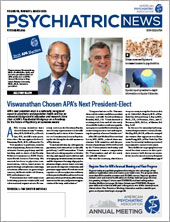The Biden administration announced on January 30 that the COVID-19 Public Health Emergency (PHE), first issued in March 2020, will end on May 11.
During the PHE, a host of restrictions were waived on the use of telehealth to help patients receive services, including mental health services, without leaving their homes. With the end of the emergency, those waivers will be lifted, and several pre-pandemic regulations will be back in effect. These include the following:
•
With very few exceptions, health care professionals registered with the Drug Enforcement Administration (DEA) will be required to have had an in-person visit with a patient in order to prescribe controlled substances.
•
Health care professionals will be required to have a DEA registration in any state in which they are prescribing controlled substances.
•
Health care professionals will be required to use HIPAA-compliant messaging software for telehealth; under the PHE, physicians and other health care professionals may use popular technology, such as Skype and FaceTime, to conduct telehealth sessions.
Importantly, some states and health care plans—recognizing that telehealth has now become a permanent feature of health care—may continue certain flexibilities and coverage; commercial and Medicaid payers may vary widely in their telehealth policies.
Additionally, the
Consolidated Appropriations Act of 2023 (HR 2617), the federal spending bill signed by President Joe Biden in late December, extends some telehealth flexibilities for physicians treating Medicare patients: Any in-person requirements for billing Medicare are suspended through at least the end of 2024. Audio-only visits are a permanently allowable telehealth modality in Medicare.
For psychiatrists who transitioned from an office-based to a hybrid or fully virtual role, the ambiguity and uncertainty of the next few months could be stressful. APA has several resources to help make sense of the expected changes to come:
•
“
Best Practices in Synchronous Videoconferencing-Based Telemental Health”: This document provides guidance on addressing the key administrative, technical, and clinical considerations when using a telehealth platform. The document—which covers such topics as legal and regulatory issues as well as telehealth platforms—was created by a joint writing committee drawn from the APA Committee on Telepsychiatry and the American Telemedicine Association Telemental Health Special Interest Group.
•
“
What Happens When the Public Health Emergency Ends? Telepsychiatry and Hybrid Practice Post-PHE”: This webinar—featuring a 60-minute presentation exploring some of the regulations to change when the PHE lifts followed by a Q&A—was recorded on January 11. It was hosted by Shabana Khan, M.D., the director of the child and adolescent telepsychiatry program at NYU Langone Health, and John Torous, M.D., director of digital psychiatry at Beth Israel Deaconess Medical Center. Khan is the chair of APA’s Committee on Telepsychiatry, and Torous is the chair of APA’s Committee on Mental Health Information Technology.
APA is now working to update and create additional materials about some of the changes to expect in May when the PHE lifts. APA members can expect additional webinars, podcasts, blog posts, FAQ documents, and more in the near future.
“Even if most of the pre-pandemic regulations come back, telepsychiatry will still be an integral part of mental health care, as will other digital tools like mobile apps and patient monitoring,” Torous said. “But as we saw with the rapid uptick of telepsychiatry services over the past two years, this is also a fast-moving field. It’s imperative we do what we can to keep our members educated and informed.”
The PHE was originally set to expire on April 11, and Republicans in the House of Representatives had submitted two pieces of legislation calling for an immediate end to the emergency. In a statement from the White House Office of Management and Budget on January 30, the administration extended the expiration date to May 11, saying an immediate end to the PHE “would create wide-ranging chaos and uncertainty throughout the health care system—for states, for hospitals and doctors’ offices, and, most importantly, for tens of millions of Americans.”
While the end of the federal public health emergency marks a turning point, many policies are based on state, local, or private actions. APA members are urged to contact the APA Practice Management Helpline, their APA district branch, state medical board, or other trusted resource for information about the status of relevant telehealth policies. ■

